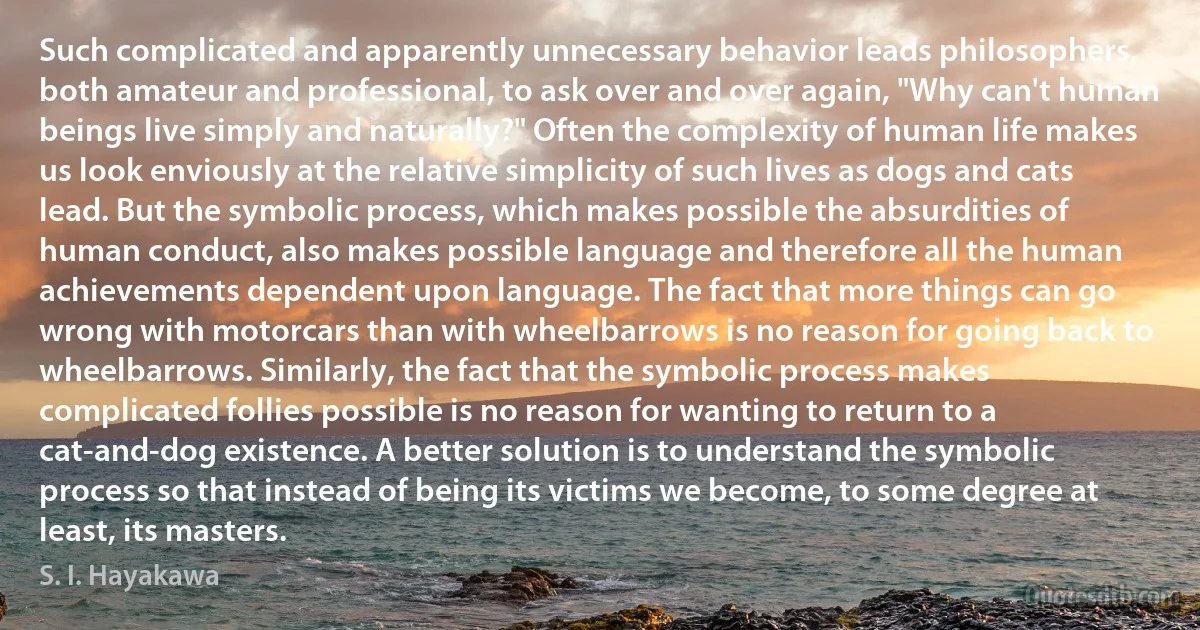
Such complicated and apparently unnecessary behavior leads philosophers, both amateur and professional, to ask over and over again, "Why can't human beings live simply and naturally?" Often the complexity of human life makes us look enviously at the relative simplicity of such lives as dogs and cats lead. But the symbolic process, which makes possible the absurdities of human conduct, also makes possible language and therefore all the human achievements dependent upon language. The fact that more things can go wrong with motorcars than with wheelbarrows is no reason for going back to wheelbarrows. Similarly, the fact that the symbolic process makes complicated follies possible is no reason for wanting to return to a cat-and-dog existence. A better solution is to understand the symbolic process so that instead of being its victims we become, to some degree at least, its masters.
S. I. HayakawaRelated topics
amateur ask complexity conduct degree human language lead lives life live possible professional reason return wanting wrong things masters dogsRelated quotes
Do you believe in God, Andrei? No. Neither do I. But that's a favorite question of mine. An upside-down question, you know. What do you mean? Well, if I asked people whether they believed in life, they'd never understand what I meant. It's a bad question. It can mean so much that it really means nothing. So I ask them if they believe in God. And if they say they do-then, I know they don't believe in life. Why? Because, you see, God-whatever anyone chooses to call God-is one's highest conception of the highest possible. And whoever places his highest conception above his own possibility thinks very little of himself and his life. It's a rare gift, you know, to feel reverence for your own life and to want the best, the greatest, the highest possible, here, now, for your very own. To imagine a heaven and then not to dream of it, but to demand it.

Ayn Rand
I am an artist, and, through my eye, must confess to a tremendous bias. In my purely literary voyages my eye is always my compass. "The architectural simplicity” – whether of a platonic idea or greek temple – I far prefer to no idea at all, or no temple at all, or, for instance, to most of the complicated and too tropical structures of India. Nothing could ever convince my EYE – even if my intelligence were otherwise overcome – that anything that did not possess this simplicity, conceptual quality, hard exact outline, grand architectural proportion, was the greatest art. Bergson is indeed the arch enemy of every impulse having its seat in the apparatus of vision, and requiring a concrete world. Bergson is the enemy of the Eye, from the start; though he might arrive at some emotional compromise with the Ear. But I can hardly imagine any way in which he is not against every form of intelligent life. (p. 338)

Wyndham Lewis
By straying from the text of the Constitution, substantive due process exalts judges at the expense of the People from whom they derive their authority. Petitioners argue that by enshrining the traditional definition of marriage in their State Constitutions through voter-approved amendments, the States have put the issue 'beyond the reach of the normal democratic process'. But the result petitioners seek is far less democratic. They ask nine judges on this Court to enshrine their definition of marriage in the Federal Constitution and thus put it beyond the reach of the normal democratic process for the entire Nation. That a 'bare majority' of this Court is able to grant this wish, wiping out with a stroke of the keyboard the results of the political process in over 30 States, based on a provision that guarantees only 'due process' is but further evidence of the danger of substantive due process.

Clarence Thomas
Take a moment to remember the times on your own spiritual quest when you felt most enthusiastic. We want to pinpoint the times in which we felt more God conscious and devotional than ever before. Conversely, look at the times when you felt unenthused and do a similar analysis. These questions might help stimulate your thought process: Are you enthusiastic about your existence as a servant of the Lord? Are you enthusiastic to follow the basic principles that will help elevate your consciousness? Are you enthusiastic in the association of saintly people? Are you enthusiastic about what you can experience in your purest state? We must examine our spiritual life on a daily, weekly, and even yearly basis. This examination will help us recognize how various activities and thoughts affect us. We should note how the quality of our experiences varies according to our absorption in the process of bhakti.

Bhakti Tirtha Swami
If Christ were to walk in this world today, do you know what would happen to Him? He would be placed in a mental institution and given psycho-therapy, just as would His Saints. The world would crucify Him today just as it did 2000 years ago, for the world has not learned a thing, except more devious forms of hypocrisy. And what would happen if, in one of my classes at the university, I would one day tell my students that all the learning of this world is of no importance beside the duty of worshipping God, accepting the God-man who died for our sins, and preparing for the life of the world to come? They would probably laugh at me, and the university officials, if they found out, would fire me-for it is against the law to preach the Truth in our universities. We say that we live in a Christian society, but we do not: we live in a society.

Seraphim Rose
